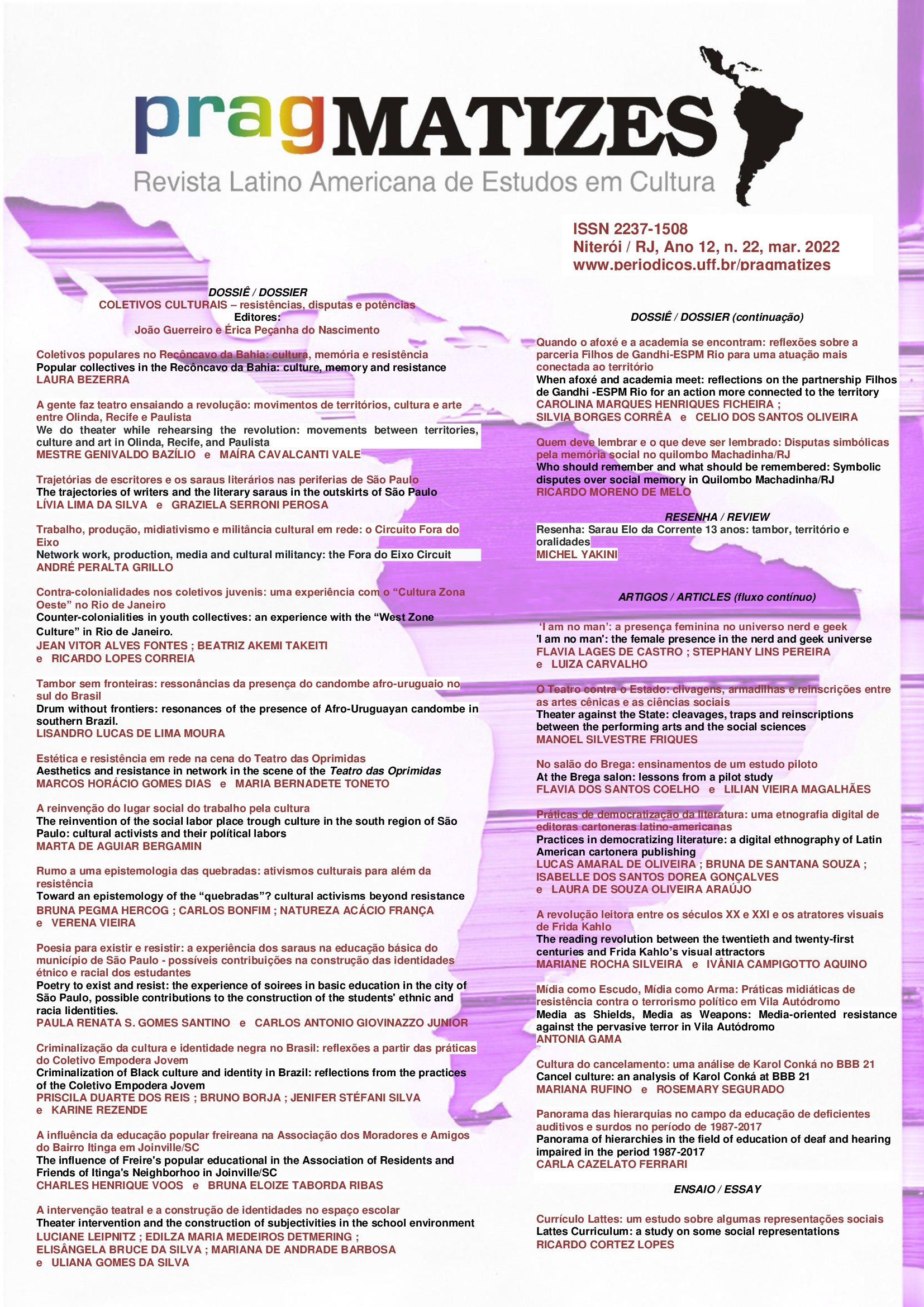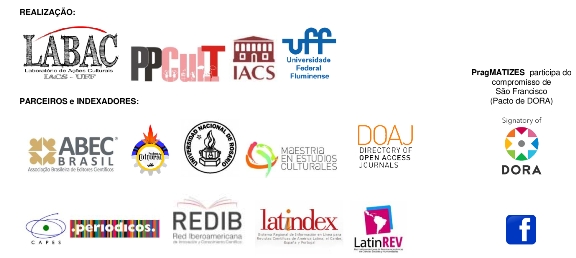'I am no man': the female presence in the nerd and geek universe
DOI:
https://doi.org/10.22409/pragmatizes.v12i22.51057Keywords:
nerd culture, female representation, identityAbstract
The nerd and geek culture has been growing constantly each year through movie productions, comic books and in stores, crawling the way out from being a niche culture to mainstream. And with its increasing popularity, so does the demand for representation not only in characters inside the productions but also within its own groups, fandoms and as consumers. This article is part of a series of researches carried out by the authors and seek to present an analysis of the toxic environment created by male behaviour towards the female presence in nerd collectives. Thus, we will seek to make a brief definition of what is considered nerd and geek nowadays, understand its divisions as a social group and analyze especially the female presence in the context of this universe: how it is perceived and received and what are the difficulties faced by nerd women. The title is a reference to a line said in the movie The Lord of the Rings: The Return of the King (2003).
Downloads
References
BECKER, Howard. Outsiders: estudos de sociologia do desvio. São Paulo: Editora Schwarcz-Companhia das Letras, 2008.
BOURDIEU, Pierre. A distinção: crítica social do julgamento. São Paulo: Edusp; Porto Alegre: Zouk, 2007.
BOURDIEU, Pierre. A dominação masculina. Rio de Janeiro: Bertrand Brasil, 2012.
CARVALHO, Luiza. Identidade e representação dos fãs de cultura nerd/geek: analisando a comic con experience. (Monografia de graduação em Produção Cultural). Universidade Federal Fluminense, Niterói, 2017.
DUARTE, Luiz Cláudio. Jogos de Tabuleiro no Design de Jogos Digitais. XI SBGames, Brasília, 2 a 4 de novembro de 2012.
ENNE, Ana Lucia Silva. À perplexidade, a complexidade: a relação entre consumo e identidade nas sociedades contemporâneas. Comunicação, mídia e consumo. São Paulo, vol. 3, n.7 p. 11-29. Jul. 2006
GALVÃO, Danielle Pini. Os nerds ganham poder e invadem a TV. Intr@ aciência, Uniesp, p. 34-41, 2009.
GOULART, Lucas; NARDI, Henrique. Gamergate: cultura dos jogos digitais e a identidade gamer masculina. Revista Mídia e Cotidiano, Niterói, v. 11, n. 13, p. 250-268, dez. 2017.
HALL, Stuart. A identidade cultural na pós-modernidade. Rio de Janeiro: DP&A, 2006.
JENKINS, Henry. Textual poachers: Television fans and participatory culture. New York ; London: Routledge, 1992.
JENKINS, Henry. Cultura da convergência. São Paulo: Aleph, 2015
LINS, Stephany. Meu cosplay, minhas regras: uma análise sobre o cosplay feminino e do espaço da mulher no universo nerd e geek. (Monografia de graduação em Produção Cultural). Universidade Federal Fluminense, Niterói, 2017.
MATOS, Patrícia. O nerd virou cool: consumo, estilo de vida e identidade em uma cultura juvenil em ascensão. (Mestrado em Comunicação). Universidade Federal Fluminense, Niterói, 2014.
MATOS, Patrícia. O nerd virou cool: identidade, consumo midiático e capital simbólico em uma cultura juvenil em ascensão. XVI Congresso de Ciências da Comunicação na Região Sudeste–Intercom, 2011.
MESQUITA, B. Por que o mundo nerd é machista? Disponível em: http://farofageek.com.br/videos/por-que-o-mundo-nerd-e-machista/. Acesso em: 12. jun. 2020.
MULVEY, Laura. Visual Pleasure and Narrative Cinema. Berlin: Grin Verlag, 2008.
POLLITT, Katha. The Smurfette Principle. The New York Times Magazine, 1991. Disponível em: https://www.nytimes.com/1991/04/07/magazine/hers-the-smurfette-principle.html.
PUIG, Rebeca dos Santos. Machismo e ‘orgulho nerd’: o que temos para comemorar? Disponível em: https://www.comunicaquemuda.com.br/orgulho-nerd-e-machismo/ Acesso em: 30 nov. 2018.
TOCCI, J. Geek cultures: media and identity in the digital age. 2009. 449 f. Dissertação (PhD em Comunicação). University of Pennsylvania, Philadelphia, 2009.
Published
How to Cite
Issue
Section
License

This work is licensed under a Creative Commons Attribution 4.0 International License.
By forwarding an original to PragMATIZES, the authors agree that the copyright related to it is transferred to the Publishing. Articles and other writings are made available in PDF format from their publication, and they can be downloaded to institutional repositories and personal pages, provided that with their proper bibliographic indication.



